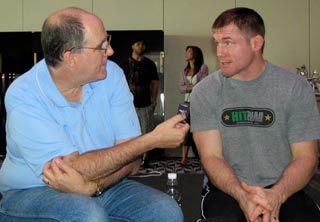 MMA is not just a sport, but also a business that creates jobs for people all over the world. Cagewriter takes a look at some of the people and jobs that keep the MMA wheels churning. First up: Yahoo! Sports columnist Kevin Iole.
MMA is not just a sport, but also a business that creates jobs for people all over the world. Cagewriter takes a look at some of the people and jobs that keep the MMA wheels churning. First up: Yahoo! Sports columnist Kevin Iole.
Cagewriter: What are your job duties?
Kevin Iole: My job is to come up with feature stories and columns that would appeal to a wide audience that follows boxing or MMA. Occasionally, I cover events, I meet with a fighter, sometimes I go to lunch or dinner with a fighter or manager.
Hardly a day goes by where I don't do a radio interview of one sort or another. A lot of times I'll do short TV gigs, discussing upcoming fights or my thoughts on fighter.
I'm supposed to stay on top of breaking news from an analytical standpoint. When news breaks, what does it mean? It's not necessarily my job to be the first guy to get it out there, but it's my job to explain to people the significance of the news.
CW: But you do break news sometimes.
KI: A lot of times, what I do when I get up in the morning, something as a reporter for more than 30 years I've gotten in the habit of doing, is make calls to people in the industry. That's how you find stories. That's how you develop relationships with people. That's the biggest part in our business. I find a lot of good stories that way, and I ending breaking news that way.
CW: What is the best part of your job?
KI: I can really live a dream. Ever since I can remember, I wanted to be a sportswriter. I love fights. I love both boxing and MMA, and I get to write about the biggest fights, the biggest stars, to say my opinion on a day-to-day basis. I can't imagine doing anything else.
CW: But what's the worst part?
KI: The biggest downside is that I can't be a fan. I'm a fan of the Steelers, and if the Steelers score a touchdown, I'm standing up cheering. I'm clapping my hands. When I cover fights, I may see some of the best fights in history, and I can't cheer. I can't clap my hands. I can't root for any particular side. I've got to be neutral.
The other downside is travel. Getting on airplanes, staying in hotels, being away from my family. I did over 100,000 miles in travel for Yahoo! last year. As much as being in exotic places is nice, I wish there was a Star Trek thing where I could get beamed into these places.
CW: What did you do before this to prepare you to be a columnist?
KI: I was a reporter for many years. I started with a small paper in Pittsburgh, and then moved to Vermont. I was there for close to 10 years, and then after having met my wife, she and I moved to Las Vegas. I was with the Las Vegas Review-Journal for about 17 years. By the time I got to Yahoo!, I had over 25 years of experience as a reporter.
CW: What advice would you give to someone starting out in MMA journalism?
KI: The first thing is to just write a lot. If you're sitting at home watching the fight, run back to your computer and write about it. Compare it to what other people do.
The second thing is read a lot of good writing. Whoever you think is a good writer, whether it be in boxing, MMA, or any other sports, read good writing. Pay attention to how they transition from paragraph to paragraph, or how they make their case. Also understand what the elements of a news story are.
Look at your work with a critical eye and ask, what could I have done better? How does somebody else do that exact same story? What points do they make better? Why is their story better than mine? If you look at that and pay attention, you're going to be able to do it. Assuming that when someone wants to be a writer, they have some skills to begin with, it's just a matter of developing them. It's not something that comes naturally. Sometimes, it's a long and tortured process.
You have to go through it multiple times before you decide that's the final product. Sometimes, people want to sit down and after 15 or 20 minutes and say, 'OK, I'm done,' and think that what they have is the best they can do. They can definitely do better.
A lot of young writers are too wordy, and they use too many big and extraneous words that can be left out. A good rule of thumb is less is more.You need to think if somebody on the subway on the way to work, they're reading your piece. Are they going to jab the guy next to them and say, 'Hey, read this?' Or will they just go to something else. If you know they're going to jab the guy, then you've done your job. If not, you've got to work to do.
Bianca Kajlich Bijou Phillips Blake Lively Blu Cantrell Bonnie Jill Laflin Bridget Moynahan Britney Spears
No comments:
Post a Comment